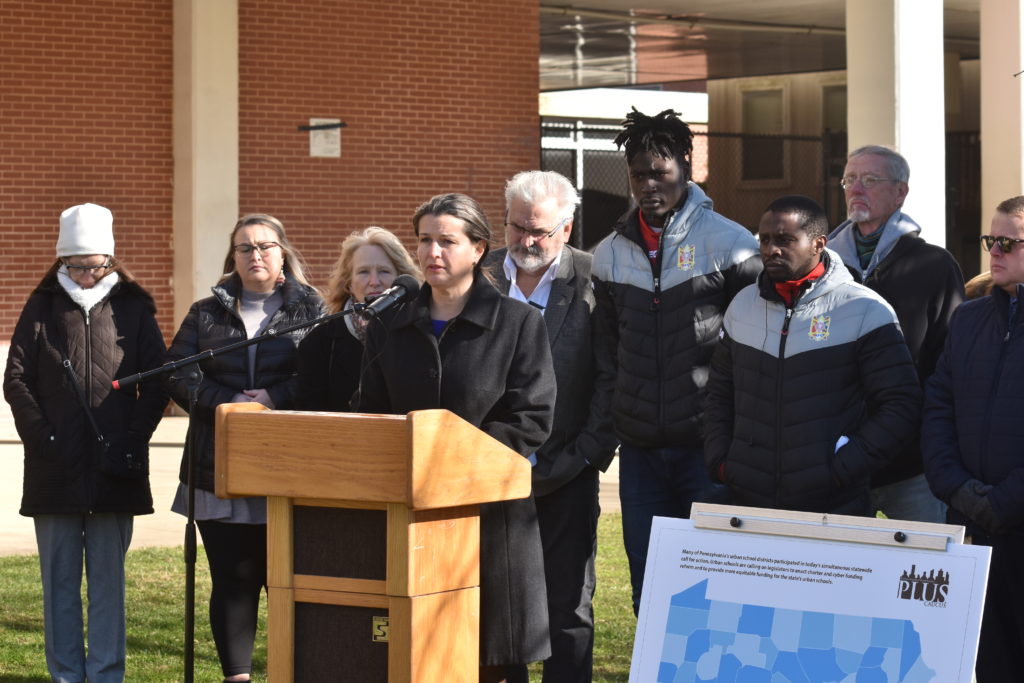
Sixty-four years after the beginning of the 1955 Montgomery, Alabama bus boycott sparked by Rosa Parks’ refusal to give up her seat to a white man, urban public school districts across Pennsylvania are using the flashpoint date to call for an end to a funding system they say is unfair and inequitable.
The Pennsylvania League of Urban Schools (PLUS) on Dec. 5 held simultaneous press conferences in schools statewide, including at the School District of Lancaster. Nearly 20 different school districts joined the call to action focusing on the need for charter and cyber reform from legislators.
Read SDoL superintendent Damaris Rau’s comments here
“We are coming together in solidarity to stand up for fair funding,” said Dr. Stephen Rodriguez, Superintendent of the Pottstown Area School District and President of PLUS. When the bulk of funding for Pennsylvania schools comes from local property taxes, urban schools are at a disadvantage, he said.
Lancaster City Mayor Danene Sorace said during the press conference essential city services also rely on local taxpayers.
“Each year, as we are preparing [the city’s] budget, I am ever mindful of the School District of Lancaster’s financials,” she said. “Will we both be raising taxes this year? And what gives in this system—the education of our children? Public safety? Groceries?”
One in seven of Pennsylvania’s K -12 public school children attend an urban school.
PLUS is calling for legislators to enact true charter and cyber-charter funding reform. Cyber charter schools are funded by state and local taxes, but local school boards have no oversight. By law, up to 25% of their teachers can be uncertified, and they don’t have to account for how they’re using their tuition payments from public school districts.
“Is it being used for flashy TV advertising campaigns or to line the pockets of executives?” asked Amanda Aikens, a fifth-grade teacher at King Elementary who spoke at the event.
Last year, SDoL spent $2.5 million on cyber charter tuition, at the rate of $11,300 per student for regular education and $24,300 per special education.
That’s the same tuition payment for students that the district would send to brick-and-mortar charter schools—but the cost of educating a cyber charter student is significantly less. Meanwhile, many public schools are operating their own cyber schools at a much more efficient rate than cyber-charters and they are seeing greater academic results. The performance of 13 of the state’s 14 cyber-charters is among the lowest 5 percent of all schools in the state.
Several legislators have introduced charter reform bills, and Governor Wolf recently introduced a full charter reform package.
Sorace, whose daughter attends SDoL, said the way Pennsylvania funds its schools creates an opportunity gap for students living in poverty.
“Our students often have educational, emotional, and physical needs that are costly,” she said “In fact, it’s estimated that it costs two and a half times more to educate a student who is living in poverty than one who is not.”
PLUS superintendents say their students deserve the same opportunities that students in suburban districts do, including: smaller class sizes, additional advanced course offerings. early education programs, adequate school counseling services, safety Improvements, infrastructure improvements, dynamic programs that are available district-wide, updated textbooks and technology, and the resources to recruit and retain a high-quality teaching staff and administration.
At the press conference, Dr. Rau called for parents, staff, and community members to contact their legislators and share the concerns about charters and cybers.
